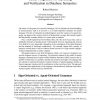Free Online Productivity Tools
i2Speak
i2Symbol
i2OCR
iTex2Img
iWeb2Print
iWeb2Shot
i2Type
iPdf2Split
iPdf2Merge
i2Bopomofo
i2Arabic
i2Style
i2Image
i2PDF
iLatex2Rtf
Sci2ools
124
click to vote
EJC
2008
2008
Center Fragments for Upscaling and Verification in Database Semantics
The notion of a fragment was coined by Montague 1974 to illustrate the formal handling of certain puzzles, such as de dicto/de re, in a truth-conditional semantics for natural language. The idea of a fragment is methodological: given the vastness of a natural language, one begins with a system which is of limited data coverage, but formally explicit and functionally complete relative to a certain goal or standard. Once a small fragment has been defined, there arises the task of upscaling, such as adding the treatment of another puzzle. Unfortunately, however, upscaling may turn out to be difficult or even impossible, depending on the assumptions of the initial fragment and the standard of functional completeness. For example, despite half a century of intensive research there is still no coherent formal account of a single natural language, verified computationally as nearly complete. This paper proposes a new kind of fragment, called center fragment, designed to ensure the longterm s...
EJC 2008 | Information Technology | Natural Language | Natural Language Communication | Single Natural Language |
| Added | 29 Oct 2010 |
| Updated | 29 Oct 2010 |
| Type | Conference |
| Year | 2008 |
| Where | EJC |
| Authors | Roland Hausser |
Comments (0)

